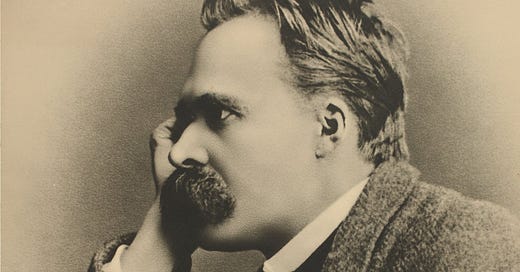NIETZSCHE AND FOOD: THE GENIUS AND HIS INTESTINE
You are what you eat: the first in a new series on Nietzsche and food
This is part of a new occasional series on Friedrich Nietzsche and food. Nietzsche wrote at some length and very interestingly about food, especially the relationship between food and thought, but his writings on this topic have, for the most part, been dismissed as uninformative, “eccentric”—or worse. This isn’t surprising, really, since the majority of his interpreters and interlocutors don’t know a thing about diet and nutrition, but there’s plenty of scientific research to support many of his claims. Even those claims that don’t have the direct scientific backing of a study deserve consideration for their incisive and suggestive qualities.
In this first instalment, I’m going to consider a brief aphorism on the intestinal qualities of geniuses, with regard to some recent research on bowel movements. Yes, we all know Nietzsche as philosopher-with-hammer, but now it’s time for Nietzsche as philosopher-with-constipation.
In Ecce Homo, Nietzsche writes, “The slightest sluggishness of the intestines is entirely sufficient… to turn a genius into something mediocre.”
This is one of many aphorisms Nietzsche wrote on the relationship between individual nutrition and quality of thought. In basic terms—very sensible terms—Nietzsche believed that mind followed body; that different diets could improve or hinder thought; and that, therefore, the philosopher would have to pay close attention to the foods he consumed if he wished to think well. And also to how he expelled them from his body.
In Twilight of the Idols, Nietzsche says, “The body, gestures, diet, physiology, everything else follows from this.”
He was writing from personal experience. As is well known, Nietzsche suffered tremendously, throughout his adult life, with digestive problems and ill health generally, which brought to an end his career as a university professor and sent him on a peripatetic life around Europe in search of comfort and cures. As well as probably having syphilis, Nietzsche suffered haemorrhoids and regular “gastric spasms,” which left him in agony.
He tried a wide variety of diets, including the consumption of steak and raw eggs. Nietzsche’s constant experimentation with his diets suggests he never truly found an optimum for himself; but even so, his comments deserve to be taken seriously, since they were the product of long-term reflection. Physical health, first and foremost his own, was perhaps Nietzsche’s most abiding concern.
In the case of his reflection on regularity and genius, Nietzsche was definitely on to something. There’s now a significant amount of research linking digestion and toilet habits to mental clarity and health, even the onset of dreaded diseases like Alzheimer’s. It’s long been known that constipation is a familiar accompaniment to dementia and other neurological conditions like Parkinson’s. But newer research has shown that constipation may actually be a cause of cognitive decline, and not just a handmaiden.
Keep reading with a 7-day free trial
Subscribe to In the Raw to keep reading this post and get 7 days of free access to the full post archives.





